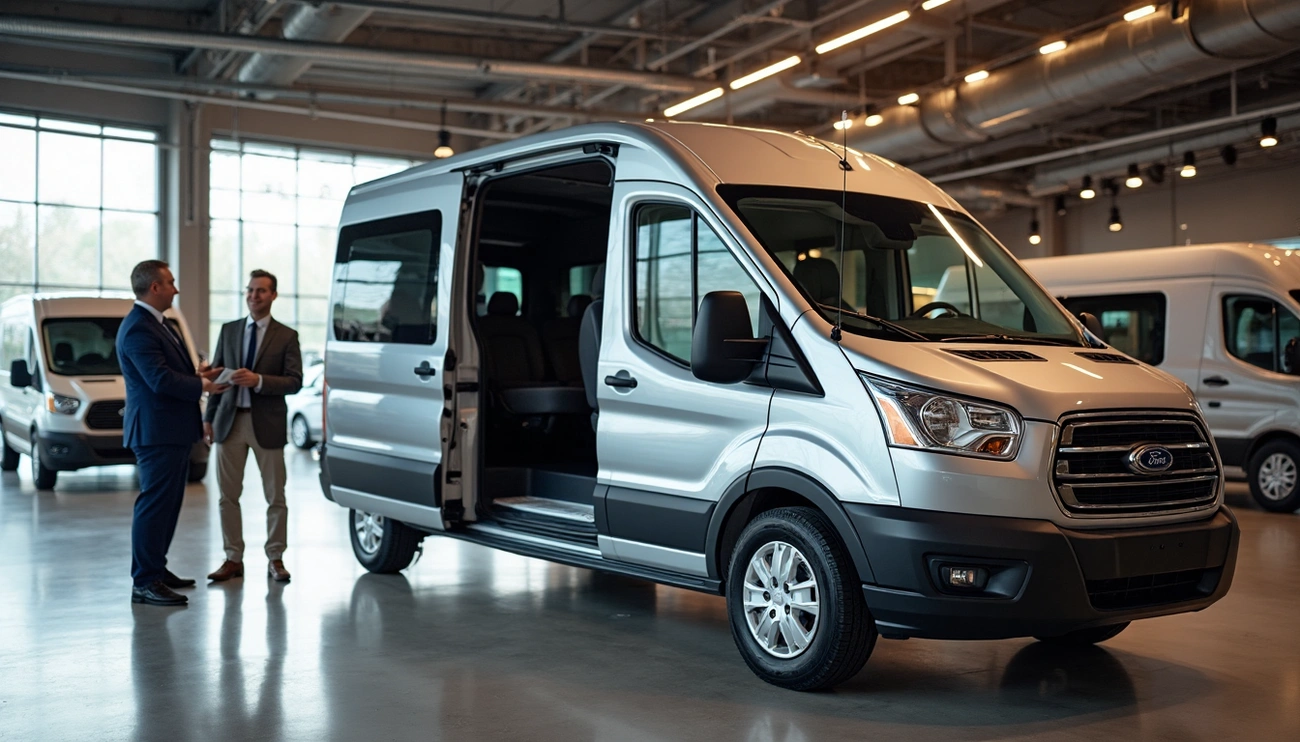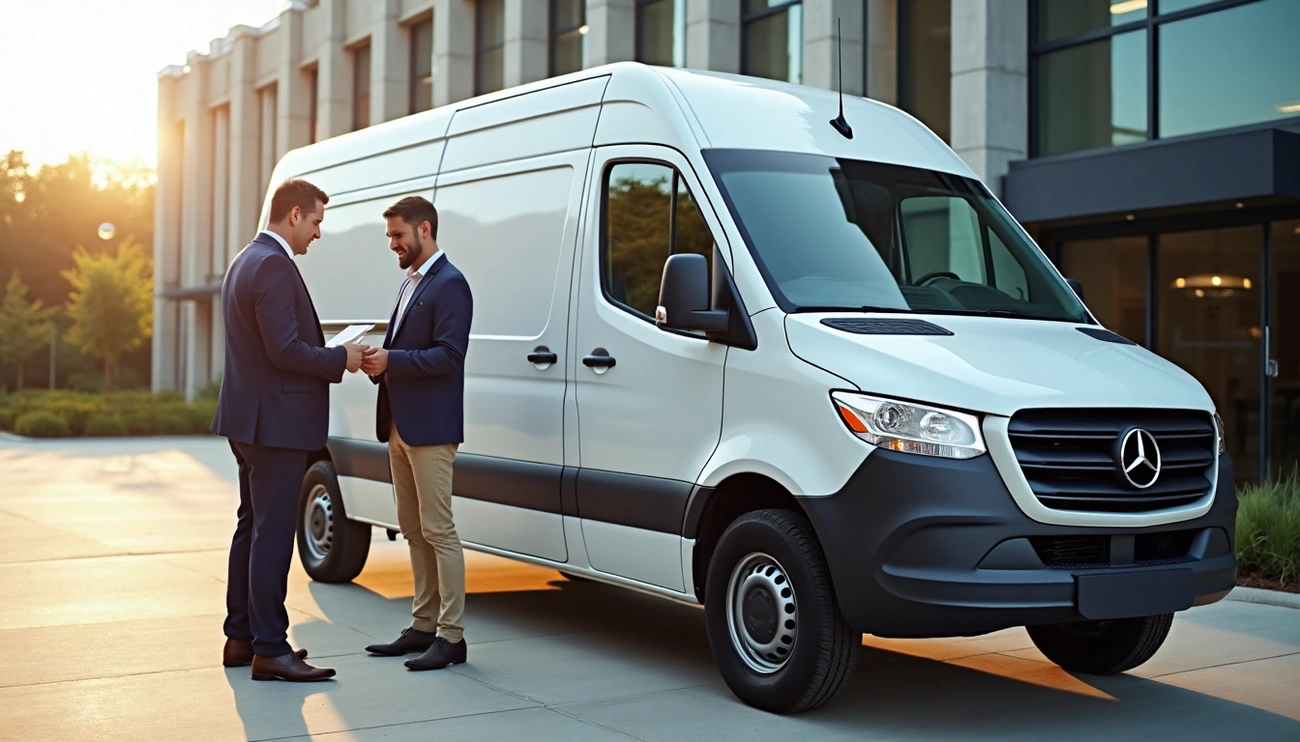Business Van Leasing
The right Business Van Leasing can transform your business operations, especially if you need dependable transportation without freezing your capital. My experience shows that a reliable van becomes vital when you deliver products, move equipment, or provide mobile services. It’s a key part of your daily operations and business growth. Source Swiss Vans
The business van leasing world might seem complex at first glance. You’ll encounter various company van agreements and commercial lease terms that need careful consideration. Many business owners don’t realize that leasing can offer more flexibility and financial benefits than buying a van outright.
This piece covers everything about business van leasing. You’ll learn about different lease types, qualification requirements for self-employed people and those with average credit scores. We’ll also look at costs and help you find the best deal that fits your business perfectly. See Ford Van Leasing
What is Business Van Leasing?
Business van leasing lets entrepreneurs use a van by paying for it over a set time without buying it outright. Think of it as a long-term rental that gives you access to commercial vehicles without spending big money upfront. See self employed van finance
How van leasing works for businesses
You start by picking the right van and lease term, which usually runs between 2-5 years. The next step needs you to put down a deposit (about 3-6 monthly payments), then you make fixed monthly payments throughout your agreement. The leasing company buys and owns the van, while your business pays to use it. See business van finance
Your lease agreement will come with mileage limits and maintenance terms. Once the contract ends, you can return the vehicle, keep the lease going, switch to a newer model, or buy it outright.
Benefits of leasing over buying
Leasing comes with several perks that business owners love:
- Improved cash flow management – Your monthly payments stay the same, which helps with budgeting and keeps your working capital free
- Lower upfront costs – You just need a deposit instead of paying the full price
- Protection from depreciation – The van’s dropping value isn’t your problem since you don’t own it
- Tax advantages – VAT-registered businesses can get back 50-100% of VAT on lease payments and write off the entire lease payment
- Access to newer vehicles – You get to drive the latest models with new tech every few years
- Maintenance packages – Most leases cover your routine maintenance and repairs
These benefits create real advantages for your business operations and finances. To name just one example, businesses with leased vans can lower their taxable profits by deducting lease payments, which could save up to 25% on lease costs. See electric van finance
When leasing makes sense for entrepreneurs
Business van leasing really shines in several situations:
New businesses with tight budgets can get the transportation they need without using up their startup money. You only need a small deposit – often just three months’ payments – which leaves cash for other significant business needs. See van finance companies
Growing businesses or those with changing demands love the flexibility of leasing. Contract terms run between 2-5 years, so you can adjust your fleet size more easily than if you owned the vehicles.
Your business image matters too. Leased vans are usually newer models that show your clients you’re reliable and successful.
Self-employed individuals and partnerships get extra benefits since they don’t pay Company Van Tax. This tax benefit, plus the chance to claim lease payments as business expenses, makes leasing a smart financial move for many entrepreneurs.
Small businesses from delivery services to mobile repair shops find that leasing gives them all the good parts of owning a van without worrying about depreciation or large upfront costs.
Types of Van Leases Available
Business van leasing comes with several different contract types. Each type has its own features that suit different business needs. Learning about these options is a vital part of making smart decisions that match your money situation and business requirements.
Contract hire
Van Contract hire is the top choice for business van leases, especially when you have VAT-registered companies. You start with an original deposit (usually three months’ rental) and then make fixed monthly payments over 24 to 60 months. When your contract ends, you give the vehicle back to the leasing company.
The benefits are clear – you get fixed cost motoring, don’t need much money upfront, and don’t worry about the vehicle losing value since the finance company handles selling it. It also helps that VAT-registered businesses can claim back up to 100% of the VAT on maintenance charges and lease rentals for commercial vehicles.
All the same, contract hire does have its limits. You need to stick to the agreed mileage or pay extra charges. It also costs a lot to end the contract early, and you must return the vehicle in good shape based on the provider’s fair wear and tear rules.
Finance lease
Van Finance lease gives you more flexibility than contract hire and comes in two main types: full pay-out and balloon payment options. Full pay-out spreads the cost evenly throughout the agreement. The balloon option gives you lower monthly payments but includes a bigger final payment based on what the van might be worth later.
This type of lease gives businesses a chance to benefit from the vehicle’s sale. When the agreement ends, you can sell the vehicle to someone else for the finance company and keep some of the money, or you can start a secondary rental period with yearly payments.
It also shows up as an asset on your balance sheet. This makes it perfect for businesses that use their vans heavily and might return them in rougher shape, since there are no strict rules about mileage or condition.
Operating lease Business Van Leasing
An operating Van lease lets you rent the asset from the finance company for a shorter time. Your monthly payments stay lower than a standard finance lease because the finance company takes on the risk of the vehicle’s future value.
We designed this mainly for commercial vehicles and equipment, with terms running from two to seven years. Your business uses the vehicle but doesn’t own it, though you still need to handle maintenance and wear and tear while you have it.
When an operating lease ends, you just return the asset with nothing more to pay. This works great for businesses that want to increase, upgrade, or renew their commercial vehicles without spending too much. The rental payments include VAT that you can offset against tax, which helps with your finances.
Short-term vs long-term leases
Short-term van leasing runs about 12 months and works great for businesses with temporary needs or specific projects. Monthly costs start higher (around £349), but you get more flexibility with less commitment and low upfront costs.
Long-term leases that run 2-5 years offer lower monthly payments (starting at about £329 for 36-month terms) and help stable businesses plan their transportation costs. Entrepreneurs who want predictable costs over longer periods often choose this option.
Your choice between short and long-term leases should depend on your business stability, cash flow, and how often you need to switch vehicles. Leasing often makes more sense than buying outright for assets that lose value quickly.
Who Can Lease a Van for Business?
Van leasing has become more accessible over the last several years. Businesses of all structures can now get commercial vehicles without a huge capital investment. Let’s look at who can get a business van lease and what you need to qualify.
Limited companies and partnerships
Limited companies and partnerships have the easiest path to getting van lease agreements. Your registered business entity must provide:
- Company details – including registration number, trading address, and annual turnover
- Director information – personal details for company directors
- Business bank details – account information and financial records
Both limited and general partnerships can qualify for van leasing. They need documents that prove the partnership exists. Each partner might need a credit check to show the group’s financial health. Leasing companies will verify your company’s registration with proper authorities through credit checks.
Self-employed and sole traders
You can definitely get a van lease as a self-employed person or sole trader. The main requirement is being a registered self-employed professional operating in the UK. You’ll need to show:
- Proof of income and financial stability
- Three years of address history
- Valid UK driving license registered at your current address
Self-employed van leases work for people in many fields, from mobile pet groomers to delivery businesses. A credit check will show your financial responsibility. Good personal credit history will help you get better terms.
New businesses and startups
New businesses without much trading history can still get van leases, contrary to what many business owners think. Limited companies don’t need any minimum trading time. You’ll just need extra paperwork:
- Complete business plan showing goals and financial projections
- Profit and loss statements
- Latest balance sheets
- Opening balance of business accounts
Some cases might need a guarantor – either a company director or a bigger related company to back the lease payments. Your previous trading history as a sole trader will count if you’ve recently formed a limited company.
Business van lease with bad credit
Bad credit won’t automatically stop you from getting a business van lease. Several specialized lenders offer bad credit van leasing options. They look at more than just your credit score. Buying an ice cream van
To boost your approval chances with poor credit, be ready to show:
- Three to six months of business statements
- A director’s guarantee (for limited companies)
- A larger initial payment might help
Some lenders care more about whether you can afford payments now rather than your past credit history. These companies usually want an initial rental of £1,800-£2,000 plus VAT to secure your van. Specialized poor credit assessors look at your whole situation instead of just the credit score, which often leads to more flexible terms.
Understanding Costs and Tax Implications
The financial structure and tax implications are the foundations of your decision-making process when you examine a business van lease. Let’s look at these key elements to help you make an informed choice.
Initial deposit and monthly payments Business Van Leasing
Your van lease cost structure starts with an original payment, taken 7-10 days after vehicle delivery. The upfront amount equals 1, 3, 6, or 9 months of your monthly rental. A bigger upfront payment reduces your monthly costs, but the total lease expense stays about the same.
Most websites show business van lease monthly payments without VAT. These fixed payments help you manage your budget better throughout the lease term.
Maintenance and insurance costs
You can add maintenance packages to your lease agreement for an extra monthly fee. These packages cover routine servicing, MOT tests, tire replacement and breakdown assistance. The payment structure matches your main lease with an original payment and monthly installments.
Standard lease agreements do not include insurance – you need to arrange it separately. Lease companies need comprehensive coverage that lists the lease holder as the main policyholder.
Tax benefits and VAT reclaim
Contract Hire lease rental payments qualify as tax-deductible expenses in profit and loss accounts. VAT-registered businesses can reclaim VAT on lease payments based on business usage. To name just one example, see how 80% business mileage means you can reclaim 80% of VAT.
Finance Lease arrangements let businesses offset interest charges against yearly profits. The van shows up as a capitalized fixed asset, and yearly depreciation charges plus interest qualify as allowable tax deductions.
Sole trader van lease HMRC considerations Business Van Leasing
Self-employed people can claim lease costs as business expenses to reduce taxable income. Sole traders don’t face Benefit in Kind tax on vans, unlike company car arrangements.
VAT-registered sole traders can reclaim up to 100% of monthly lease payments as company expenses. You must keep detailed records of business versus private mileage because HMRC might need this documentation to verify your expense claims.
How to Choose the Right Van Lease Deal
The quest to find the perfect business van lease needs a smart way to assess your needs and options. Quick purchases won’t cut it. You need to think over multiple factors that will affect your business operations for years to come.
Assessing your business needs
Start with a good look at your specific requirements before you check out van options. Think about how much cargo space you’ll need based on what you usually transport. Factor in the payload capacity your business requires and how often you’ll use the van. Your annual mileage estimate matters substantially – it shapes your lease agreement terms and helps you dodge those pricey excess mileage charges later.
Comparing business van lease deals
Monthly payments shouldn’t be your only focus when you review different providers. Get into these details:
- Initial deposit requirements (typically 3-6 times monthly payment)
- Contract duration options (24, 36, 48 months)
- Included services (road tax, breakdown coverage)
- Maintenance packages and their scope
- Early termination policies and associated fees
Put all this information together to make solid comparisons between deals instead of just picking the lowest monthly cost.
Choosing the right vehicle type
Your van’s size should match your business needs and practical considerations perfectly. Small vans are great for urban businesses with limited cargo needs. They offer better fuel efficiency and are easier to maneuver. Medium vans give most entrepreneurs the versatility they need. Large vans maximize space but can get pricey and create parking challenges.
Avoiding hidden fees and clauses
Take time to really review lease terms and conditions. You should know what’s included and what’s not. The fair wear and tear guidelines matter – they decide what condition is acceptable when you return the van. On top of that, you need clear insurance requirements. Most leases need comprehensive coverage with specific minimum limits. The maintenance responsibilities are crucial too. Missing required service could break lease terms and lead to penalties.
A step-by-step approach through these points will help you secure a business van lease that works for your operations without any surprises.
Conclusion
Final Thoughts on Business Van Leasing
Business van leasing gives entrepreneurs like me an affordable way to handle commercial transportation needs. This piece has shown how van leasing works great for businesses of all sizes.
The biggest advantage is how leasing keeps your working capital intact while you get newer vehicles without ownership hassles. Each option – contract hire, finance lease, and operating lease – has its own perks based on what your business needs and your financial situation.
In stark comparison to what most people think, any business structure can qualify for van leasing. Limited companies, partnerships, sole traders, and startups with little trading history can get lease agreements. Your credit history matters, but specialized lenders help those with less-than-perfect credit scores.
Tax benefits make business van leasing worth a closer look. VAT-registered businesses can claim back much of their lease payments. Sole traders get simpler tax treatment than company cars’ owners do. These benefits alone make leasing an attractive option.
Finding the right lease deal needs a full picture of your business needs, accurate mileage estimates, and good term comparison. The lowest monthly payment isn’t always the best value for the whole package.
Business van leasing is a practical solution that grows alongside your business. You get predictable monthly costs, fewer maintenance worries, and freedom to upgrade vehicles as your business grows. A well-laid-out van lease agreement can boost your business success whether you deliver products, move equipment, or provide mobile services.
FAQs Business Van Leasing
Q1. What are the main benefits of leasing a van for my business? Leasing a van offers several advantages, including improved cash flow management, lower upfront costs, protection from depreciation, potential tax benefits, access to newer vehicles, and often included maintenance packages. This allows businesses to have reliable transportation without tying up significant capital.
Q2. Can I lease a van if I’m self-employed or have bad credit? Yes, self-employed individuals and those with less-than-perfect credit can still lease a van. Self-employed professionals need to provide proof of income and financial stability. For those with bad credit, specialized lenders offer options and may focus more on current affordability rather than just credit history.
Q3. How do the costs of leasing a van compare to buying one outright? Leasing typically involves lower initial costs compared to purchasing, with a smaller deposit and fixed monthly payments. While you don’t own the vehicle at the end, you avoid depreciation costs and can often claim tax benefits on lease payments. The total cost over time may be higher than buying, but leasing offers better cash flow management and flexibility.
Q4. What types of van leases are available for businesses? The main types of business van leases include contract hire, finance lease, and operating lease. Contract hire is the most popular, offering fixed monthly payments and return of the vehicle at the end. Finance lease provides more flexibility and potential profit-sharing, while operating lease is a shorter-term option with lower monthly costs.
Q5. How do I choose the right van lease deal for my business? To choose the right lease, assess your business needs including cargo space, payload capacity, and estimated mileage. Compare different providers’ offers, looking beyond just monthly payments to consider initial deposits, contract duration, included services, and potential hidden fees. Also, ensure you select the appropriate van size and type for your specific business requirements.




